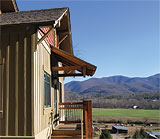There is such a thing as a free ride
U.S. carbon-dioxide emissions from transportation sources rose 151 percent from 1960 to 2001, with the greatest increases in the Gulf South and the Southeast, according to The Carbon Boom, a recent report by Public Interest Research Group affiliate Environment North Carolina. At the same time, North Carolina’s vehicle travel increased by 198 percent, according to the same report.
Why are people driving so much more than they used to? Environment North Carolina suggests the answer is “sprawling development patterns, demographic shifts, low fuel prices, and massive public investment in highways, coupled with insufficient investment in public transit.”
But as fuel prices rise and doomsday warnings about climate change pop up everywhere from the local news to the silver screen, a lot of people are starting to seek alternatives to the smoggy, one-person-per-car commute. That search just got easier in Asheville: As of July 3, six new evening-service routes were added to Asheville Transit Services buses. In a move that one regular bus rider quipped was the city’s way of “finally joining the 21st century,” certain buses will now run as late as 10:30 p.m. And there’s more: From Aug. 14 through Nov. 11, all ATS fares will be free as part of a promotional initiative to get riders on the bus.
So green it’s golden

photo by Rebecca Bowe
|
The Doug and Darcy Orr Cottage at Warren Wilson College has won a prestigious green designation enjoyed by only some 100 other buildings across the country. The building, which houses the office of admissions, received a Gold rating under the Leadership in Energy and Environmental Design (LEED) system, developed by the U.S. Green Building Council. The rating system is a national standard that ranks green buildings according to such categories as site sustainability, water efficiency, energy use, materials and resources, indoor environmental quality and innovation.
The LEED certification marks the culmination of a project that integrated the efforts of a dozen student work crews. Wood was harvested from college forestlands for the trim and siding, and salvaged antique doors and used office furniture were used for the interior.
But using local and recycled building materials is only the half of it: This building consumes 50 percent less energy than a conventional structure its size, thanks to its highly efficient design.
WMD on wheels
A coalition of Western North Carolina organizations known as Common Sense at the Nuclear Crossroads recently published a 51-page report detailing the transport of radioactive cargoes on mountain area highways. Entitled “Asheville: At the Nuclear Crossroads,” the report pinpoints surrounding regional nuclear facilities and describes the hazardous nuclear waste materials that regularly roll through I-26 and I-40.
The report also calls for more spending to better equip emergency responders to handle a spill. “This is just a nightmare waiting to happen,” says Ned Doyle, who contributed to the report and heads up the annual Southern Energy and Environment Expo. “The accidents have been minimal thus far, but if the proposals to build new nuclear power plants go through, there will be a staggering increase of nuclear transport. It’s important to recognize the fact that it’s only a matter of time before something happens. The best-case scenario would be that we’re dead wrong.”
To access the report, visit www.peacemakersjournal.org/csnc/index.html.



Before you comment
The comments section is here to provide a platform for civil dialogue on the issues we face together as a local community. Xpress is committed to offering this platform for all voices, but when the tone of the discussion gets nasty or strays off topic, we believe many people choose not to participate. Xpress editors are determined to moderate comments to ensure a constructive interchange is maintained. All comments judged not to be in keeping with the spirit of civil discourse will be removed and repeat violators will be banned. See here for our terms of service. Thank you for being part of this effort to promote respectful discussion.